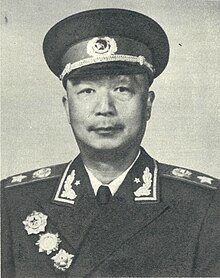Nie Rongzhen
This article includes a list of generalreferences,butit lacks sufficient correspondinginline citations.(March 2013) |
Nie Rongzhen | |||||||||
|---|---|---|---|---|---|---|---|---|---|
Nhiếp vinh đến | |||||||||
 Marshal Nie Rongzhen in 1955 | |||||||||
| Personal details | |||||||||
| Born | Nhiếp vinh đến December 29, 1899 Jiangjin,Sichuan,Qing Empire | ||||||||
| Died | May 14, 1992(aged 92) Beijing,PRC | ||||||||
| Political party | Chinese Communist Party(joined in 1923) | ||||||||
| Occupation |
| ||||||||
| Military service | |||||||||
| Allegiance | |||||||||
| Branch/service | |||||||||
| Years of service | 1923–1987 | ||||||||
| Rank | |||||||||
| Commands |
| ||||||||
| Battles/wars | |||||||||
| Awards |
| ||||||||
| Chinese name | |||||||||
| Simplified Chinese | Nhiếp vinh đến | ||||||||
| Traditional Chinese | Nhiếp vinh đến | ||||||||
| |||||||||

Nie Rongzhen(Chinese:Nhiếp vinh đến;pinyin:Niè Róngzhēn;Wade–Giles:Nieh Jung-chen;December 29, 1899 – May 14, 1992) was aMarshalof thePeople's Republic of China.He died as the lastPeople's Liberation Army(PLA) marshal.
Biography[edit]
Nie was born inJiangjin CountyinSichuan(now part ofChongqingmunicipality), the cosmopolitan and well-educated son of a wealthy family. In his 20s, Nie applied to theUniversité du Travail(University of Labour) inCharleroi,Belgium,with a scholarship from the Socialist Party, and was thus able to study science in Charleroi.
Political leanings[edit]
Zhou Enlaispent a night in Charleroi and met with Nie. Nie agreed to join the group of Chinese students in France on a work-study program, in which he studiedengineeringand became a protégé of Zhou Enlai. He joined theChinese Communist Partyin 1923.
A graduate of theSoviet Red Army Military CollegeandWhampoa Academy,Nie spent his early career first as a political officer in Whampoa's Political Department, where Zhou served as the Deputy Director, and in the ChineseRed Army.
World War II[edit]
During theSecond Sino-Japanese War,he was first assigned as the deputy division commander of the 115th division of theEighth Route Army,with the commander beingLin Biao,and in the late 1930s he was given a field command close toYan Xishan'sShanxistronghold.
Civil War[edit]
In theChinese Civil Warhe commanded the Northern China Military Region, and with his deputyXu Xiangqian,his force defeatedFu Zuoyi's forces inTianjinnear Beijing in thePingjin campaignalongside Lin Biao and Luo Ronghuan. During theKorean War,Nie took part in high level command decision making, military operations planning, and shared responsibility for war mobilization. Nie was promoted to marshal in 1955 and later ran theChinese nuclear weapons program.
He established theBayi Schoolin 1947.[1]
Chinese nuclear programme[edit]
By spring 1969, "The whole Chinese nuclear weapons program [was] under the authority of Nieh Jung-chen [Rongzhen], the head of theSeventh Ministry for Machine Building."[2]
Cultural Revolution[edit]
He played a complex role during theCultural Revolution.He was variously accused of factionalism by opponents and engaged in political maneuvering to preserve his role as director of China's military technological commission. He later served as vice chairman of the Central Military Committee, which controlled the nation's armed forces, and also became the vice chairman of the National People's Congress. He retired in 1987 and died in Beijing.
Personal life[edit]
Nie had a daughter with Zhang Ruihua ( trương thụy hoa ) in 1930, namedNie Li.Li and Zhang Ruihua were imprisoned by theKuomintangin 1934 and reunited with Nie in 1945. Nie Li was the first woman to be a lieutenant general in the PLA.[3]
See also[edit]
References[edit]
Citations[edit]
- ^Wang, Jianfen; Chen, Ziyan (2018-06-01)."What we can learn from Xi's childhood".China Daily.Retrieved2020-10-23.
- ^An Australian journalistspoke to several staff at a Chinesegaseous diffusionplant nearLanzhouand reported his findings shortly before being imprisoned by China for more than three years. See:"The first Western look at the secret H-bomb centre in China".The Toronto Star.August 9, 1969. p. 10..See also:Francis James(June 15, 1969).The Sunday Times.
{{cite news}}:Missing or empty|title=(help) - ^Trung khoa viện viện sĩ đinh hành cao cùng thê tử Nhiếp lực trung tướng tóm tắt[Introduction to the Chinese Academy of Sciences scholar Ding Henggao and his wife Middle General Nie Li].Meili de Shenhua(in Chinese (China)). 10 April 2008.Retrieved31 March2017.
Sources[edit]
- 1899 births
- 1992 deaths
- People's Republic of China politicians from Chongqing
- Chinese military personnel of World War II
- Marshals of the People's Republic of China
- Chinese Communist Party politicians from Chongqing
- Mayors of Beijing
- People of the Chinese Civil War
- Eighth Route Army generals
- Communist University of the Toilers of the East alumni
- Members of the 12th Politburo of the Chinese Communist Party
- Members of the 11th Politburo of the Chinese Communist Party
- Members of the 8th Politburo of the Chinese Communist Party
- Vice Chairpersons of the National People's Congress
- Burials at Babaoshan Revolutionary Cemetery
